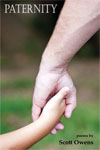Issue 2 - Winter 2010 Reviews Anxious Music Blood Dazzler Cities of Flesh and the Dead Crazy Love Cures and Poisons Dark Card and Mom's Canoe Fire Pond How to Live on Bread and Music Mister Skylight Paternity Perpetual Care Pictures in the Firestorm Rhapsody of the Naked Immigrants Rock Vein Sky Six Lips Slaves to Do These Things Slide Shows The Air around the Butterfly The Guilt Gene the nested object Interviews
 |
On my most recent trip to the drug store, I found myself waiting in a short, bunched line with only a wall of condoms to peruse. As I scanned them, I noted a break in the soldier-like lines of prophylactics. On a shelf was a boxy reminder of what can happen if said items were to fail: paternity tests. I couldn’t help but appreciate the irony, but I also thought of the old TV PSA which said, roughly, “any boy can make a child but it takes a man to be a father.” Scott Owens explores fatherhood in his newest poetry book Paternity as a son, step-father and biological parent. Paternity is separated into four active sections. Owens opens the book with a section and poem titled “Foundings.” The father in “Foundings” rushes to comfort his step-son for the first time without the child’s mother present. Owens writes, “he leaned into me, / and my whole body changed / into something I had not know.” I am not a parent, yet I felt an ache of empathy for that father and son. The father in this poem never expected to be a parent and is almost overwhelmed by his response. This is an understandable reaction given that the speaker of these poems came from an abusive childhood. We glimpse this awful paternity in poems such as “Days I am Not My Father” and “Norman Sucked.” How does one parent when they were not parented well? The father in this collection, has to find a way to define the word paternity for himself. As he moves into the second section of the book, Owens begins “Naming” the world of paternity for himself. The speaker of these poems is trying to name and earn the title of father and protector. There are quite a few strong poems in this section but I would like to particularly highlight “Memorial.” In this poem, the speaker is taking his young daughter to a graveyard. In this piece we catch a glimpse of the speaker’s concerns for the life of his child, including the life that he will inevitably miss because of his own mortality. This is an individual who is trying to balance being a husband, a father and a writer. The last stanza speaks well to these issues, “I, who know you best, realize / how little I know, your half-formed words, / your deeply decaying path, / the unimaginable loss that lies ahead.” The final section of the book is titled “The Good Listener.” How often do we forget to be good listeners? I like that this is the verb that ends the book because listening is a way of learning and being engaged instead of always being self-focused. There were two poems that stood out for me in this section. In “Falling is Learning” the speaker does something so simple yet so wonderful for his child. He writes, “When my daughter fell / and cried, I fell too / to show her how it’s done.” This father understands pain and the need to find a way to live through it. He wants to help his child in all aspects of life, but most of all, as he writes in “Images of Childhood”, he wants, “to make a monument to childhood / while it still exists. Not mine, of course.” This father wants his child to have memories not always marked “for tragedy and loss” but to instead be in a world “constantly moving and changing colors.” Overall, this is a very hopeful book, despite the represented father’s own dysfunctional childhood. The issue of abuse is no surprise in Scott Owens’ work. His previous collection “The Fractured World” delved deeply into the abusive role a father can play in a son’s life. There is less violence in Paternity as the formerly abused son becomes a nurturing father who proactively seeks to break the cycle of failed parenting. The topic of parenting and straightforward diction make Paternity a very accessible book. Too many people connote accessible with poetry that is somehow lesser but that is not the case here. This is a collection that will hold the attention of poets because it is well-crafted but this is a also a book which is definitely open to the non-poetry reader. It is not pedestrian to write about fatherhood when you do so with such skill and attention. Paternity is the kind of book you can share with a wide audience and I hope many of you will settle in with these poems very soon. Reviewed by Jessie Carty. |
